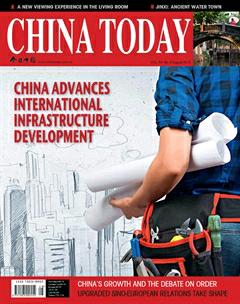Remember History and Preserve World Peace
A commemoration service and military parade were held in Beijing on September 3, 2015 to mark the 70th anniversary of the victory of the Chinese Peoples War of Resistance Against Japanese Aggression. Top leaders from China and around the world attended the event. Participants also included heads of the United Nations and other international organizations, and individuals or families of those who had participated in the war effort in China.
China hopes the commemorative activities will encourage people to remember the events of history, prevent a repetition of the tragedy of war, and safeguard world peace.
Countries like China, the U.S., the U.K., and the Soviet Union made enormous sacrifices to win victory in the antiFascist war and build the post-war international order based on the Cairo Declaration, Potsdam Proclamation, and UN Charter.
In accordance with the Potsdam Proclamation, Japan enacted democratic reforms and established the principle of sovereignty of the people. Meanwhile, a new constitution was adopted, which stipulated that “aspiring sincerely to an international peace based on justice and order, the Japanese people forever renounce war as a sovereign right of the nation and the threat or use of force as a means of settling international disputes. In order to accomplish the aim of the preceding paragraph, land, sea, and air forces, as well as other war potential, will never be maintained. The right of belligerency of the state will not be recognized.”
The Potsdam Proclamation legally banned Japanese militarism while restraining the right wing forces audacious ambition to remilitarize, setting up a political system to pursue post-war peace for Japan. In addition, it made clear provisions as to Japans territory. The Potsdam Proclamation is a component of the post-war international order in the Asia-Pacific. Conforming to international laws like the Vienna Convention on the Law of Treaty, the Proclamation is a potent legal defense of world peace.
However, Japans lower house passed disputed security bills in the summer of 2015 and submitted them to the upper house. If enacted, the bills will allow the Japanese forces to engage in armed conflicts overseas and help defend others, even if Japan is not attacked, under a policy called collective self-defense.
It reveals Japans militarism is resurging and growing, threatening the post-war international order in East Asia and world peace. Asian people who suffered under Japans cruel militarism and peace-loving people in other parts of the world have expressed their anxiety and anger. Japan is expected to develop future-oriented relations with other Asian countries by reflecting on history.endprint
After World War II, the UN Charter established the multilateral international order with the United Nations at its core, and the collective security mechanism with the Security Council at its core. It has brought peace to the world and popularized the principles of practicing democracy in international relations and the rule of law.
As one of the permanent members of the United Nations Security Council, China has proactively taken part in rebuilding the post-war international order while providing increasingly more solutions towards promoting global governance under the mechanism of tolerance and consultation.
Today, China has adopted more practical diplomatic policies, endeavoring to contribute more global public products with the aim of boosting joint development of the world.
The New Development Bank of BRICS and the Contingency Reserve Arrangement as well as the Asian Infrastructure Investment Bank are expected to provide genuine assistance to Asian countries and developing countries throughout the world.
A review of the bitter wartime period will remind people to cherish peace. China holds unswervingly to its principle of safeguarding peace.endprint
- CHINA TODAY的其它文章
- Initiating a New Partnership Between China and Developed Countries
- China and Advanced Economies–A Win-Win Relationship
- Fangshan’s Wineries and Ecological Practices
- Sustainable Development Mode on the“Roof of the World”
- “We Must Grasp the Opportunity that Paris Offers”
- Face History and Maintain Peace

